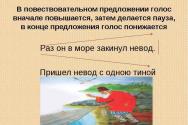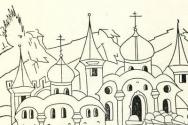Ostrovsky "The Thunderstorm". Analysis of the final scene of drama A
The final scene of the drama. It’s not for nothing that the author’s sparse stage directions for the last act read: “The scenery of the first act. Twilight". The twilight world is presented to us by a talented playwright, a world in which a “thunderstorm” is not capable of dispelling the darkness except at the everyday level. And the death of Katerina, despite all the efforts of the author to give it the volume of a symbol, is tragic, but not dramatic.
Katerina was destroyed by her own concepts of good and evil, her dreams of flying remained dreams, she could not escape from the twilight reality of that time. What a pity... Katerina Kabanova is romantic with her indomitable desire for beauty, for freedom of human expression, and organic hatred of tyranny and violence. She says: “Why don’t people fly!.. sometimes it seems to me like a bird. When you stand on a mountain, you feel the urge to fly. That's how she would run up, raise her hands and fly. Something to try now? »
Sharply at odds with the moral and everyday ideas of the bourgeois merchant environment, not wanting to live with a husband she does not love and respect, and not submitting to her tyrant mother-in-law, she thinks: “Where to now? Should I go home? No, it doesn’t matter to me whether I go home or go to the grave. Yes, to home, to the grave!.. to the grave! It’s better in the grave... But I don’t even want to think about life. Live again? No, no, don't... not good! And people are disgusting to me, and the house is disgusting to me, and the walls are disgusting!” She, striving for the extraordinary, dreams wonderful dreams: “Or golden temples, or some extraordinary gardens, and everyone sings invisible voices, and the smell of cypress, and the mountains , and the trees seem not to be as they usually are, but as if they were painted on images. And it’s like I’m flying, and I’m flying through the air.”
There were only two paths before Katerina - bondage and the grave. Her hatred of despotism and love of freedom are so strong, her spontaneous protest against everything that oppresses the human personality is so effective that she prefers death to captivity.
At that time, in her environment, Katerina could find liberation only in death. N. A. Dobrolyubov writes: “Sad, bitter is such liberation; but what to do when there is no other way out..."
Struck by the death of Katerina, even the weak-willed, quiet Tikhon raises his voice against Kabanikha. Overcoming his submission, he frantically shouts: “Mama, you ruined her! You, you, you..."
Katerina’s protest and her death were in vain. Tikhon’s pathetic rebellion will soon be suppressed, this is clear, it’s not in vain that Kabanikha promises to deal with him at home. Boris, in fact, himself asked God for a quick death for Katerina - a pitiful creature, unworthy of such high love, a slave of his uncle, of everyday life, of the twilight world. Kuligin, with all his scientific knowledge, is also not a fighter, all he is capable of is sarcasm: “Her body is here, but her soul is not yours now, she is before a judge who is more merciful than you!”
Analysis of an episode of a dramatic work
(6th scene of act 4 of A.N. Ostrovsky’s drama “The Thunderstorm”)
The culmination of A.N. Ostrovsky’s play “The Thunderstorm” is the 6th scene of the 4th act. The scene of the popular repentance of the main character is the most intense moment in the development of the conflict both in Katerina’s soul and in her clash with her mother-in-law, Marfa Ignatievna Kabanova. Before our eyes there is a struggle between a living and free feeling and the religious fear and moral duty of a married woman. The maturation of this conflict is shown in previous episodes: in Boris’s conversation with Varvara about Katerina’s possible confession, in the remarks of passersby that “the thunderstorm will not pass in vain,” in the self-taught inventor Kuligin’s reasoning about the thunderstorm “grace,” in the threats of the half-mad lady. The heroine anticipates death from the very beginning of the action, which is why we perceive Katerina as a tragic person. The desire to be loved and to love is condemned by Kabanikha’s sanctimonious morality. Maybe it's better to pretend that you love?
Honest and open, Katerina does not want to do this, and she does not want to meet secretly, like Varvara. Yes, she is different, not like everyone else, and this is her trouble, her tragedy. Only a morally pure person can be tormented by pangs of conscience and feelings of guilt.
Episode 6 begins with remarks from the old lady, to which no one except Katerina pays attention. In Rus', holy fools and madmen have long been revered and their visions listened to. The impressionable Katerina doesn’t just listen - other people’s words hit her right in the heart: “Beauty is our ruin!.. It’s better to be in the pool with beauty!..” The author does not describe the heroine’s appearance, her beauty is of a different kind - internal. She is not needed in this world of lies, hypocrisy and fear. The motives of beauty and death here sound like an antithesis; they are united in a terrible prophecy: “Why are you hiding! There's no need to hide! You're obviously afraid: you don't want to die! I want to live!”
Here is the path for the heroine...
The word “hide” is heard three times: twice in the lady’s words and in the author’s remark. Apparently, you can’t escape fate. A thunderclap is like a sentence, and the form of punishment is determined for the heroine - “to burn in fire.” Varvara sympathizes with her daughter-in-law, understanding her torment. But she can only help with advice: “...pray, it will be easier.” And Katerina, in horror, notices a picture of “fiery hell” on the half-erased frescoes of the gallery. The heaviness on her soul requires a way out, and it comes.
Before the heroine’s repentance, we note the remark: “Kabanova, Kabanov and Varvara surround her.” They surround, press, press... And here it is - a breakthrough of feelings: “My whole heart exploded! I can’t stand it anymore!” The episode is very emotional, and this is emphasized by the abundance of exclamatory sentences.
Brought up in patriarchal traditions, Katerina addresses her relatives according to seniority: “Mother! Tikhon! I am a sinner before God and before you!” In the first place is God. He is the highest judge for the heroine. This is also a manifestation of the heroine’s religiosity.
It is also interesting to trace the behavior of Varvara and Tikhon. Varvara tries to shield Katerina, feeling guilty of her sin: “She’s lying, she doesn’t know what she’s saying.” Tikhon also guessed what his wife would repent of. Feeling sorry for her (after all, she asked to take her with him!), he tries to stop Katerina. The remark here is extremely eloquent: “confused, in tears, he tugs at her sleeve.” He warns his wife, fearing his mother’s anger, even “wants to hug her.” And Kabanikha triumphs: “I said it, but you didn’t want to listen. That’s what I’ve been waiting for!”
The heroine's repentance occurs when everything comes together for her: pangs of conscience, fear of a thunderstorm as a punishment for sins, predictions of walking townspeople, betrayal of Boris (he cowardly disappears at the decisive moment). Katerina confesses her sin publicly, in church, as is customary in the Orthodox world, which shows her truly Russian soul. The scene of repentance inevitably brings the tragic denouement of the play closer.
The drama "The Thunderstorm" appeared in print in 1860. Its plot is quite simple. main character, Katerina Kabanova, not finding a response to her feelings in her husband, fell in love with another person. Tormented by remorse, and also not wanting to lie, she confesses her act in church, publicly. After this, her life becomes so unbearable that she commits suicide.
This is the eventual outline of the work, with the help of which the author reveals to us a whole gallery human types. Here are merchants - tyrants, and honorary mothers of families - guardians of local morals, and pilgrims - pilgrims, telling fables, taking advantage of the darkness and lack of education of the people, and home-grown scientists - projectors. However, with all the variety of types, it turns out to be easy to notice that they all seem to fall into two camps, which could roughly be called: “ dark kingdom" and "victims of the dark kingdom."
The “Dark Kingdom” consists of people in whose hands power is concentrated, those who can influence public opinion in the city of Kalinov. First of all, this is Marfa Ignatievna Kabanova, who is respected in the city, considered a model of virtue and a keeper of traditions. “A prude,” Kuligin says about Kabanova, “she favors the beggars, but completely eats up her family...” And indeed, Marfa Ignatievna’s behavior in public differs in many ways from her behavior at home, in everyday life. The whole family lives in fear of her. Tikhon, completely suppressed by his mother’s power, lives only with one simple desire - to escape, even if only for a short time, from home, to feel like a free person. Tikhon’s sister, Varvara, also experiences all the hardships family environment. However, unlike Tikhon, she has more strong character and she has the audacity, even if secretly, to disobey her mother.
The last scene of the drama is the culmination of the work, in which the confrontation between representatives of the “dark kingdom” and its victims is maximally aggravated. Having neither wealth nor high social status, the “victims” dare to challenge the inhumane order prevailing in the city.
The action begins with Tikhon returning home and learning about his wife’s betrayal. He, as he himself admits to Kuligin, is ready to forgive Katerina, but at the same time understands that his mother will not allow him to do this. Tikhon does not have the will to resist Kabanova. And although he beat Katerina, he feels sorry for her.
The death of Katerina, who fell in love as only very strong natures can love, at the end of the drama is natural - for her there is no other way out. Life according to the laws of the “dark kingdom” is worse for her than death, the death of the soul is worse than the death of the body. She does not need such a life, and she prefers to part with it. The confrontation between representatives of the “dark kingdom” and its victims reaches its highest point precisely in last scene, over the body of dead Katerina. Kuligin, who previously preferred not to get involved with either Dikiy or Kabanikha, throws it in the latter’s face: “Her body is here, ... but her soul is now not yours: she is now before a judge who is more merciful than you!” Tikhon, completely downtrodden and crushed by his domineering mother, also raises his voice of protest: “Mama, you ruined her.” However, Kabanova quickly suppresses the “rebellion,” promising her son to “talk” to him at home.
Katerina’s protest could not be effective, since her voice was lonely and no one from the heroine’s circle, from those who can also be classified as “victims” of the “dark kingdom,” was able not only to support her, but even to fully understand her. The protest turned out to be self-destructive, but it was and is evidence of the free choice of an individual who does not want to put up with the laws imposed on her by society, with sanctimonious morality and the dullness of everyday life.
So, in the last scene of the drama, the confrontation between representatives of the “dark kingdom” and its victims was reflected with particular force. The accusations that Kuligin and Tikhon throw in the face of those who “run the show” in the city of Kalinov show the emerging shift in society, the emerging desire of young people to live in accordance with their conscience, and not with the sanctimonious, hypocritical morality of their “fathers.”
Protest to a worthless life, to the dark forces of the kingdom of house-building.
After Ostrovsky’s drama “The Thunderstorm” was published and staged, contemporaries saw in it a call for renewal of life, for freedom, since it was written in 1860, when everyone was waiting for the abolition of slavery and serfdom in the country.
There are several conflicts in Ostrovsky's play "The Thunderstorm", but how can you decide which one is the main one?
In Katerina we saw a protest against Kabanov’s concepts of morality, a protest carried to the end.
The task of exposing economic and spiritual tyranny in the “dark kingdom” of the merchants was set by A. N. Ostrovsky in the drama “The Thunderstorm”.
A.N. Ostrovsky, the author of numerous plays about the merchants, is rightfully considered the “singer of merchant life” and the father of Russian national theater. He created about 60 plays, the most famous of which are “The Dowry”, “The Forest”, “Our People - Let's Be Numbered”.
Ostrovsky's drama "The Thunderstorm" is the most significant work famous playwright. It was written in 1860 during a period of social upsurge, based on materials from Ostrovsky’s trip along the Volga in 1856. The playwright planned to write a cycle of plays about the provincial merchants, which would...
The drama “The Thunderstorm,” published in 1860, was a kind of summary of Ostrovsky’s creative achievements. It revealed more clearly both his satirical power and his ability to affirm progressive trends emerging in life.
A. N. Dobrolyubov called Ostrovsky’s play “The Thunderstorm” the most decisive work, since “the mutual relations of tyranny and voicelessness are brought to tragic consequences in it... .
Alexander Nikolaevich Ostrovsky, for the first time in Russian literature, deeply and realistically depicted the world of the “dark kingdom”, painted colorful images of tyrants, their life and customs. He dared to look beyond the iron merchant gates.
The drama "The Thunderstorm" was written by Alexander Nikolaevich Ostrovsky in 1859 after traveling along the Volga.
Ostrovsky's plays reflected, as if in a mirror, the whole life of the Russian merchants. The drama “The Thunderstorm” shows the reader a reliable picture of the tragedy, which can be considered a completely common occurrence for the merchant environment.
The highest artistic achievement of A. N. Ostrovsky in the pre-reform years was the drama “The Thunderstorm”. The author takes us to the provincial merchant town of Kalinov, whose residents stubbornly cling to the centuries-old way of life.
The drama "The Thunderstorm" was conceived under the impression of Ostrovsky's trip along the Volga (1856-1857), but was written in 1859. "The Thunderstorm," as Dobrolyubov wrote, is without a doubt the most decisive work Ostrovsky".
The central place in the drama “The Thunderstorm” is occupied by the image of Catherine. The main thing that sets her apart from Russian women of that time is her love of freedom, that love of freedom that no one managed to strangle.
Ostrovsky in his play “The Thunderstorm” divided people into two categories: some are the oppressors of the “dark kingdom”, others are the people downtrodden by them.
A.N. Ostrovsky, the author of numerous plays, is truly considered the “singer of merchant life.” It was the depiction of the world of the merchants of the second half of the 19th century, called by Dobrolyubov in one of his articles “the dark kingdom,” that became main theme Ostrovsky's creativity.
Ostrovsky A. N.
Essay on the work on the topic: Analysis of the final scene of A. N. Ostrovsky’s drama “The Thunderstorm”
Love is higher than the sun and stars,
She moves the sun and the stars,
But if this real love.
The drama “The Thunderstorm” was written by Ostrovsky on the eve of the revolutionary situation in Russia, in the pre-storm era. The play is based on a conflict of irreconcilable contradictions between an individual and the surrounding society. The cause of the conflict and everyone
misfortunes - money, division of society into rich and poor. In Ostrovsky's plays there is a protest against despotism, lies, and the oppression of man by man. This protest reached its greatest strength in the drama “The Thunderstorm”. The struggle for a person for his right to freedom, happiness, a meaningful life - this is the problem that Ostrovsky solves in the play “The Thunderstorm”.
How is it developing? A strong, freedom-loving person finds himself in an environment alien to him, in a family where his personality is stifled. Katerina’s tragedy lies in the fact that she is alien to the Kabanov family: she was brought up in a free atmosphere. Favorite daughter in the family. In the Kabanov family, everything is built on deception and lies. There is no sincere respect between family members; everyone lives under fear of their mother, under dull submission.
Katerina is a poetic person, she feels the beauty of nature and loves it, she very sincerely wants to love, but who?! She wants to love her husband, mother-in-law.
Can a woman imbued with freedom, love for nature, with the heart of a bird, come to terms with the violence and lies that reigned in the Kabanov family?
The mutual relationship of tyranny and voicelessness led her to tragic consequences.
Religion brought poetry to Katerina, because she didn’t read books, didn’t know how to read and write, but her features folk wisdom, denounced in a religious form, brought to her by the church - this beautiful world folk art, the folklore in which Katerina was immersed.
Suffocating in the Kabanovs' house, yearning for freedom, for love, for truly kind human relationships, Katerina does not put up with bondage, the thought of leaving the hateful house is vaguely, unclearly born in her mind. But these feelings must be suppressed (she is Tikhon’s wife). A terrible struggle takes place in the heart of a young woman. We see her in the midst of an intense internal struggle. She fell deeply and honestly in love with Boris, but is trying in every possible way to suppress the living motivating feeling within herself.
She doesn’t want to see her loved one, she’s suffering.
What about the thunderstorm? Why does the first act talk about an approaching thunderstorm? This is a natural phenomenon. A spiritual storm seems sinful and terrible to her. The world of religious ideas contradicts the living feelings that awaken in her. Sin
scares Katerina.
How does the conflict develop in her own soul?
To Katerina’s words that she doesn’t know how to deceive! Varvara objects: “Our whole house rests on this.” But Katerina does not accept the morality of the “dark kingdom”. “...I don’t want to do this!...I’ll better endure it as long as I can endure it!” “And if he can’t stand it...there’s no way he can hold me back by any force. I’ll throw myself out the window, throw myself into the Volga. I don’t want to live here, I won’t, even if you cut me.”
“Eh, Varya, you don’t know my character. Of course, God forbid this happens!” “And I want to break myself, but I just can’t”... “Last night the enemy confused me again. After all, I had left home.” There is an internal struggle. What is reflected in this painful struggle? Force? Weakness? To change oneself means to remain the faithful wife of a man whom she does not love. (And there’s no reason to love him.) But a woman with the heart of a free bird cannot be a slave in Kabanikha’s house. And it seems to her that her call to will is a temptation from the devil.
A turning point comes: Katerina is finally convinced that her husband is not worth not only love, but also respect. And here is the last outbreak of intense internal struggle. First, throw away the key: after all, destruction lurks in it (spiritual destruction, she is afraid not of her family, but of destroying her soul.)
“Leave him?!” No, not for anything in the world!” The date scene opens with a drawn-out folk song, which emphasizes the tragedy of Katerina’s love for Boris.
Katerina's first meeting with her beloved is deeply tragic. “Why have you come, my destroyer?” “You ruined me!” How strong her feeling must be if, in his name, she consciously goes to certain death. A strong character! Deep feeling! An enviable feeling! Not everyone can love like that. I am convinced of Katerina’s extraordinary spiritual strength. “No, I can’t live!” She is sure of this, but the fear of death does not stop her. Love is stronger than this fear! Love conquered even those religious ideas that shackled her soul. “After all, I can’t forgive this sin, I’ll never forgive it.” “After all, he will fall like a stone on the soul,” says Katerina when she meets Boris, and admits to him that for the sake of love “I was not afraid of sin.” Her love turned out to be stronger than religious prejudices.
The thunderstorm that gathers in the first act here breaks out over the poor victim of the “dark kingdom.” But the struggle in Katerina’s soul is not over yet. But I am sure that Katerina is not an unrequited victim, but a person with a strong, decisive character, with a living, freedom-loving heart of a bird.
Not afraid of punishment, she ran away from home to say goodbye to Boris. Not only does she not hide, she calls out to her beloved at the top of her voice: “My joy, my life, my soul, my love!”... “Answer!”
No! She is not a slave, she is free. If only because she has lost everything, she has nothing more to value, not even life, in the name of love. “Why should I live now?!”
In the scene with Boris, Katerina envies him: “You are a free Cossack.” But Katerina does not know that Boris is weaker than Tikhon, he is constrained by fear of his uncle. He is not worthy of Katerina.
In the finale, victory is achieved over the internal enemy: over dark religious ideas. Katerina is convinced of her right to freedom of choice between life and death. “It’s all the same that death will come, that it itself...”, but you can’t live like that!” – she thinks about suicide. "Sin!" “Won’t they pray? He who loves will pray.”
The thought of love is stronger than the fear of God. Last words– an appeal to a loved one: “My friend! My joy!
Goodbye!"
Ostrovsky showed the complex tragic process of emancipation of the reviving soul. Here darkness clashes with light, ups give way to downs. Liberation develops into protest. And “the strongest protest is the one that finally rises from the chests of the weakest and most patient.” (Dobrolyubov.)
http://vsekratko.ru/ostrovskiy/groza92
Love is higher than the sun and stars,
She moves the sun and the stars,
But if it's true love.
The drama “The Thunderstorm” was written by Ostrovsky on the eve of the revolutionary situation in Russia, in the pre-storm era. At the heart of the play
There is a conflict of irreconcilable contradictions between an individual and the surrounding society. The cause of the conflict and everyone
Misfortune is money, the division of society into rich and poor. In Ostrovsky's plays there is a protest against despotism, lies,
Oppression of man by man.
This protest reached its greatest strength in
Drama “Thunderstorm”.
The struggle for a person for his right to freedom, happiness, a meaningful life - this is the problem that Ostrovsky
Decides in the play “The Thunderstorm”.
How does the main conflict of the drama develop? A strong, freedom-loving man finds himself in an environment alien to him, in a family,
Where personality is stifled.
Katerina’s tragedy lies in the fact that she is alien to the Kabanov family: she was brought up in a free atmosphere.
Favorite daughter in the family. In the Kabanov family, everything is built on deception and lies. There is no sincere respect between family members, everything
They live under the fear of their mother, under dull submission.
Katerina is a poetic person, she feels the beauty of nature and loves it, she very sincerely wants to love, but
Whom?! She wants to love her husband, mother-in-law.
Can a woman imbued with freedom, love for nature, with the heart of a bird, come to terms with violence, lies that
Reigned in the Kabanov family.
The mutual relationship of tyranny and voicelessness led her to tragic consequences.
Religion brought poetry to Katerina, because she didn’t read books, didn’t know how to read and write, but the features of folk wisdom,
Dressed in a religious form, the church brought it to her - this is the wonderful world of folk art, folklore, in which there was
Katerina is submerged.
But these feelings are necessary
Suppress (she is Tikhon's wife). A terrible struggle takes place in the heart of a young woman. We see her in the midst of tension
Internal struggle. She fell deeply and honestly in love with Boris, but is trying in every possible way to suppress the living motivating feeling within herself.
She doesn’t want to see her loved one, she’s suffering.
What about the thunderstorm? Why does the first act talk about an approaching thunderstorm? This is a natural phenomenon. It seems like a mental storm
She is sinful and terrible. The world of religious ideas contradicts the living feelings that awaken in her. Sin
Scares Katerina.
How does the conflict develop in her own soul?
To Katerina’s words that she doesn’t know how to deceive! Varvara objects: “Our whole house rests on this.” But
Katerina does not accept the morality of the “dark kingdom”. “.I don’t want to do this! I’ll better endure it as long as I can!” “But not
It will be tolerated, so no force can hold me back. I’ll throw myself out the window, throw myself into the Volga. I don’t want to live here, I never will,
Even if you cut me.”
“Eh, Varya, you don’t know my character. Of course, God forbid this happens!” “And I want to break myself, but not
I can’t do it.” “Last night the enemy confused me again. After all, I had left home.” There is an internal struggle. What
Does this painful struggle affect you? Force? Weakness? To change oneself means to remain a faithful wife of a man,
Which she doesn't like. (And there’s no reason to love him.) But a woman with a free heart cannot be a slave in Kabanikha’s house
Birds. And it seems to her that her call to will is a temptation from the devil.
A turning point comes: Katerina is finally convinced that her husband is not worth not only love, but also respect. AND
Here is the latest outbreak of intense internal struggle. First, throw away the key: after all, destruction lurks in it (destruction
Spiritual, she is afraid not of her family, but of destroying her soul.
Katerina's first meeting with her beloved is deeply tragic. “Why have you come, my destroyer?” “You ruined me!” What
Her feeling must be just as strong if, in his name, she consciously goes to certain death. A strong character! Glubokoye
Feeling! An enviable feeling! Not everyone can love like that. I am convinced of Katerina’s extraordinary spiritual strength. "No,
I can’t live!” She is sure of this, but the fear of death does not stop her. Love is stronger than this fear! Love
Her soul also conquered those religious ideas that bound her. “After all, I cannot atone for this sin, I cannot atone for
Never". “After all, he will fall like a stone on the soul,” says Katerina when she meets Boris, and admits to him that for the sake of love “sin
I wasn’t afraid.” Her love turned out to be stronger than religious prejudices.
The thunderstorm that gathers in the first act here breaks out over the poor victim of the “dark kingdom.” And the fight in
Katerina's soul is not yet complete. But I am sure that Katerina is not an unrequited victim, but a person with a strong, decisive
Character, with a living, freedom-loving heart of a bird.
Not afraid of punishment, she ran away from home to say goodbye to Boris. Not only does she not hide, she speaks loudly
Calls her beloved: “My joy, my life, my soul, my love!” “Answer!”
No! She is not a slave, she is free. If only because she has lost everything, she has nothing more to value, not even life, in the name of
Love. “Why should I live now?!”
In the scene with Boris, Katerina envies him: “You are a free Cossack.” But Katerina does not know that Boris is weaker than Tikhon, he
Shackled by fear of his uncle. He is not worthy of Katerina.
In the finale, victory is achieved over the internal enemy: over dark religious ideas.
“It’s all the same whether death comes or not.”, but live like that
It is forbidden!" – she thinks about suicide. "Sin!" “Won’t they pray? He who loves will pray.”
The thought of love is stronger than the fear of God. The last words are an appeal to your loved one: “My friend! My joy!
Goodbye!"
Ostrovsky showed the complex tragic process of emancipation of the reviving soul. Here darkness fights with light,
Ups give way to downs. Liberation develops into protest. And “the strongest protest is the one that
It finally rises from the breasts of the weakest and most patient.” (Dobrolyubov.)
- PODKHALYUZIN – central character comedy by A. N. Ostrovsky “Our people - we will be numbered” (1849). In the name of the hero, Ostrovsky plays with soft “l” and sliding “z” (Lazar Elizarych Podkhalyuzin), hinting at the grain of the image of a rogue clerk...
- In connection with the 35th anniversary of Ostrovsky’s activity, Goncharov wrote to him: “You alone built the building, the foundation of which was laid cornerstones Fonvizin, Griboyedov, Gogol. But only after you, we Russians can...
- ZHADOV is the hero of A. N. Ostrovsky’s comedy “Profitable Place” (1856). A young man, a recent university graduate, J. comes to his uncle, a high-ranking official, an ardent denouncer of bureaucratic morals. J.'s intolerance, his harshness and lack of respect...
- The drama “Dowry” was written by A. N. Ostrovsky in 1879, when the results of the 1861 reform had already become clear. The “dark kingdom” has changed - trade and industry began to develop faster, the former...
- A special hero in Ostrovsky’s world, adjacent to the type of poor official with feeling self-esteem, – Karandyshev Yuliy Kapitonovich. At the same time, his pride is hypertrophied so much that it becomes a substitute for other feelings....
- A. N. Ostrovsky entered literature as a writer of unprivileged sections of society; heroes from the nobility appeared in his works only sporadically. In the 60s, the attempt to master the image of a noble hero ended...
- Paratov Sergei Sergeevich - “a brilliant gentleman, one of the ship owners, over 30 years old.” P. is a chic playmaker, spectacular and handsome man, who at the end of the play turns out to be an ordinary dowry seeker for rich merchants....
- The drama “Dowry” was written by A. N. Ostrovsky in 1879, when the results of the 1861 reform had already become clear. The “dark kingdom” has changed - trade and industry began to develop faster, no longer...
- Respect for elders has been considered a virtue at all times. One cannot but agree that the wisdom and experience of those who belong to the older generation usually helps the youth. But in some cases...
- Ostrovsky wrote a wonderful play “Dowry”. It describes the life of one beautiful, young and beautiful girl– Larisa Dmitrievna Ogudalova, who turned out to be a victim of unfortunate circumstances. “Dowry” is similar in meaning to the drama...
- Alexander Nikolaevich Ostrovsky in his work sought to combine the severity of contradictory views and aspirations with the breadth of understanding of life processes and problems. This was served by the unusual composition of Ostrovsky’s plays, which allowed the appearance...
- Human! We must respect the Man! A. M. Gorky “Dowry” is one of the best plays by A. N. Ostrovsky. She is constantly on stage and has been filmed twice. Modern reader and the viewer in this drama...
- It's no secret that the drama of the great Russian playwright Alexander Nikolaevich Ostrovsky is one of the pinnacles of not only domestic but also world literature, and perhaps one of the central works...
- Lipochka's character also comically combines complacency and spiritual backwardness. She considers herself a young lady who has received an “education,” but treats the servants, clerks, and even her mother with cold, rude disdain. Especially...
- All the heroes and heroines of A. N. Ostrovsky can be divided into those who have power over others and those without rights. In Ostrovsky’s later plays, the former acquire the traits of “tyranny,” and the latter become victims of these “tyrants.” The main character of A. N. Ostrovsky’s play “Dowry” is Larisa Dmitrievna, the daughter of Kharita Ignatievna Ogudalova. Her mother has a “small fortune”, there is nothing to give a dowry from, since she lives openly, everyone...
- The theme of sin, retribution and repentance in highest degree traditional for Russian classical literature. It is enough to recall such works as “The Enchanted Wanderer” by N. S. Leskov, “Who Lives Well in Rus'” by N. A....
- The female image, its inconsistency and true beauty have always attracted playwrights - gov. One of the main features of Russian literature is attention to female characters, and often the removal female image How...








